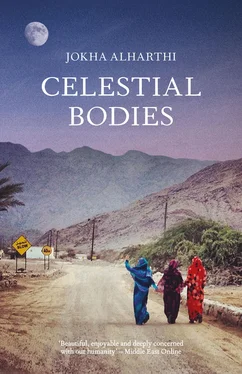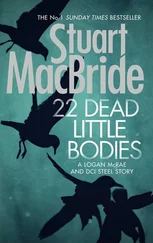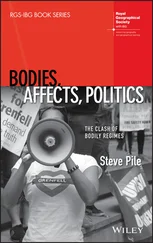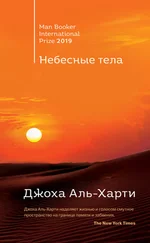Azzan began to let himself hope. This boy would be his successor. This boy would carry his father’s legacy — his name and property. This was the boy on whom he would depend in his old age. Hamad’s mother left his hair alone to grow long like a girl’s, hoping to fool the jinn, to evade the destructive envy that might target her son. The leather and silver amulets were still there, concealed under his clothing, until he reached the age of eight and died.
He couldn’t dodge fate, as his parents had always worried and silently suspected. But death took its time. Death gave their hearts time to swell, years enough to grow heavy with love for him, and only then it took him.
Qamar swallowed. What happened to him?
Azzan smiled slowly and closed his eyes. What happened to him was what happened to the Range Rover.
Range Rover? You mean, a car?
Azzan’s thin smile turned to a bitter smirk. Yes, the green Range Rover.
When the fever struck Hamad down and it was no longer any use to rub herbal preparations onto his burning body, Salima walked to her uncle’s house. Shaykh Said had grown old by then but he had not grown soft enough that his heart would melt at her entreaties. She pleaded with him to remember his brother Shaykh Masoud, her father. She begged him to be merciful, to think of his faith. She spoke in the name of the generosity, high mindedness and honour befitting a shaykh. Everything she could possibly think of, she said, as a mother whose child was lacerated by fever.
His response didn’t change. The Range Rover doesn’t leave al-Awafi unless I’m in it.
The next day Hamad’s fever shot even higher. The boy was delirious. This time Azzan went with Salima to her uncle’s house. Azzan talked to the shaykh for a long time, explaining that his son’s condition was very bad and growing worse, and the only car in al-Awafi was Shaykh Said’s Range Rover, and they needed to rush Hamad to Saada Hospital in Maskad. If they went by donkey it would take four or five days, too long to save the boy. Azzan would pay whatever Shaykh Said asked for and would cover the driver’s pay as well.
Shaykh Said said, I don’t have anything more to say. The Range Rover doesn’t leave al-Awafi, and your son can get well without those doctors. All children get fevers and then they’re fine.
Azzan and Salima left his house avoiding looking at the green vehicle hunched at the door. Shaykh Said had bought it two years before. When his driver brought it grandly into al-Awafi, absolutely everyone came out of their homes to witness it. Even Shaykh Said’s ancient mother, leaning on her slave women, came out to see it. But when she heard the motor and saw its black wheels whirling, she threw a rock at it, calling out to the people of al-Awafi that it was the work of the Devil. Her rock broke one of the windows. Shaykh Said ordered her women to take his mother inside, threatening that if they ever brought her out again when the car was there, he would whip them then and there, in full daylight for all to see. From that day on, the car never budged except when Shaykh Said occupied the front passenger seat. If one of his wives was in the car he covered all the windows with curtains.
Salima cried all the way home. Now Azzan’s dreams held only one image: the car he must have. He swore he would take permission to buy one from the Sultan himself, as Shaykh Said had done. He would own a car even if he had to sell his farm — his whole inheritance — to do it.
But Hamad didn’t wait until his father filled his vow. The fever killed him first.
They removed his clothes and his amulets, and they erected the ritual bench made of dried date-palm fibre in the courtyard. Neighbours brought buckets of water from the canal to wash him. They sprinkled him with incense and perfumed him with aloes-wood oil, and wrapped his body in a white shroud. The funeral procession marched to the graveyard west of al-Awafi.
Judge Yusuf said to Azzan, Your son is in heaven, and he will be there to bring you cold water when you are thirsty. You know, Azzan, that your child will serve you in heaven, on the day of Judgement, as long as you are patient with God’s will. Be consoled for it was God who took your son.
Azzan said nothing. He did not say to the judge that he had wanted his son to bring him cold water in his old age, still on earth. He bore himself with resignation as was expected, and shook hands with those who came to offer their condolences. He shook every hand that was outstretched to his, even Shaykh Said’s.
Tears fell from the Moon’s eyes. Aah, it’s true what the proverb says: Every father knows misery and pain.
From Hamad’s burial to this day, Azzan told her, he had never spoken about his son. Only now. She turned to him. Even with his mother? He shook his head. Especially not with his mother.
As they spoke, Salima was slipping cautiously out of a house in al-Awafi. She had just come from a very important appointment. She walked quickly, so that she would be certain to be back at home before Azzan could return from his evening with the Bedouin men.
She tried to avoid thinking about how dark it had been in there, or about the conditions set for this peculiar agreement. But the last sentence the man had said, when she was already at the door, pounded insistently in her head. Don’t worry, Bride of the Falaj! Ugh, she thought. These people who never forget! Her daughter had married and given birth, and another daughter was engaged, but people still called her by this hateful nickname. Angry, she quickened her pace, wanting to be at home.
When Mayya had got through her forty days, I brought her home, back to our living quarters, a small wing attached to my father’s house. She stayed there, secluded, closing her ears to the words that had spread through al-Awafi like fire across dry wood. People were whispering about a relationship between her father and an enticing Bedouin woman.
At that time I was driving my father’s white Mercedes between Muscat and al-Awafi several times every week. I spent my long commutes musing that the peaceful happiness I enjoyed was almost too much for me. Was it too much, this feeling that I had it all? It made me nervous.
Did I deserve such happiness, or didn’t I? A happy man driving his father’s car to his own home, where the wife he loves holds their child, and where his father presides, still alive and even healthy.
That’s what I was, a happy man. Simply that. A young man, barely past his first twenty years, whose dreams reached no further than what he had in his hands. But he was a little afraid of what he held in his hands. The dark interior of the Mercedes, the glancing light reflected in the shiny buttons on tiny London’s clothes, the drops of water falling from Mayya’s hair at dawn, the flash of the needle in her hand as she sewed fabric flowers onto Baby London’s gowns, my father’s rare smiles. In all of it I saw — me, the so-very-lucky man — that this happiness was a lot for me to bear. It was too much for me. Somehow I knew that — whatever the reason, and I had no idea what it might be — I was not worthy of all this joy.
Ah, Zarifa! You were wrong to believe that Habib had gone forever. No, Zarifa, it doesn’t work like that. Habib was careful to plant his seeds in his son. The young shoots would grow to prick and wound you, just as Habib gave you pain.
Habib, whether you are lying cold in some faraway grave, or whether you drowned in the Shatt al-Arab, or whether you’re even still alive and making money in Dubai or Baluchistan, wherever and however you may be now, if only you could have left us before you sowed the Devil’s own seeds!
We are free, Mother. Free according to the law. And we will name our children whatever we like.
Читать дальше












